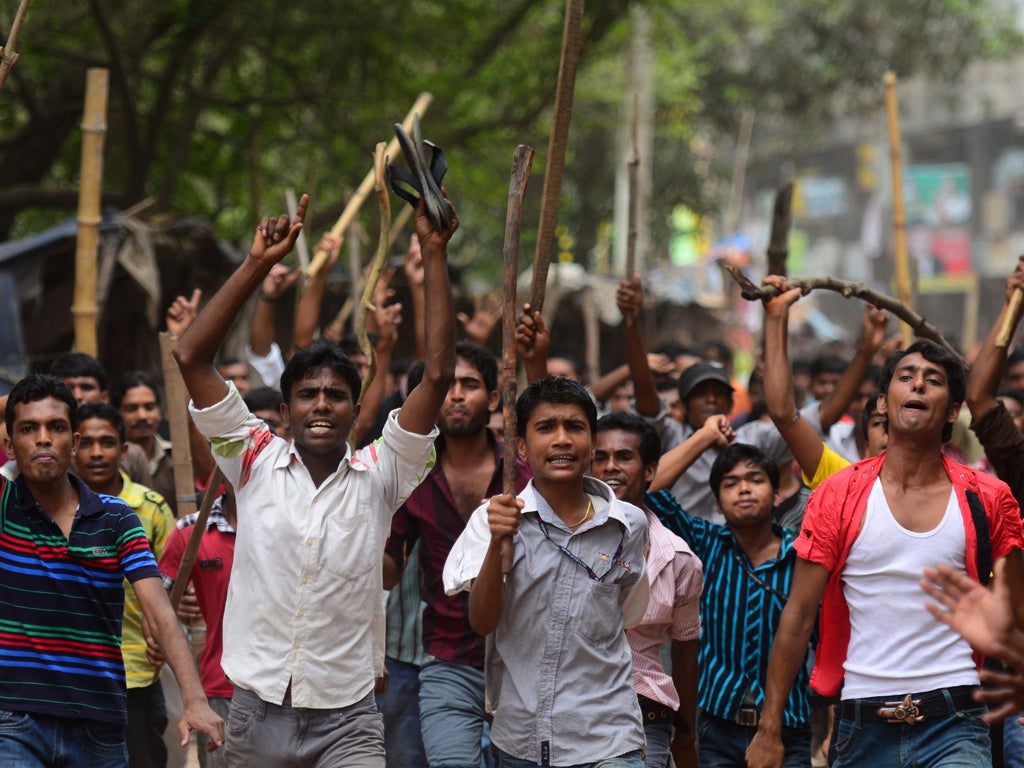The scars of Bangladesh’s birth have yet to heal
The Pakistani army tried to cripple the new nation by murdering those who might become leaders

After the collapse of a clothing factory in Bangladesh, the forces of law there were swift to take action.
The owners were arrested and charged with neglect that led to the deaths of hundreds within days. The efficiency and directness of the action was impressive. But the law in that part of the world does not always move so swiftly, as a much graver and still more horrible series of crimes shows us.
This week, a British citizen, Chowdhury Mueen-Uddin, and a US citizen, Ashrafuzzaman Khan, were included in indictments issued by Bangladeshi courts. They were charged with collaboration with Pakistani forces and murder of victims in the genocide that accompanied the birth of Bangladesh. Mueen-Uddin’s British lawyer, Toby Cadman, said that the charges were “grossly defamatory”, and that they were “refuted [sic] in their entirety”.
“The arc of the moral universe is long, but it bends towards justice,” as Martin Luther King said. That arc is, in this case, exceedingly long, and justice may be served only when perpetrators as well as victims are long dead. It will be served only by history. These acts took place in 1971, as East Pakistan fought to achieve independence as Bangladesh. Very large numbers of people were murdered after the Pakistanis attempted first to suppress the general election result, and then to prevent independence. Very many women were systematically raped – perhaps 200,000, and we know that there were 25,000 unwanted pregnancies. Groups were specifically targeted – one of the most horrifying facts about the war of independence was that intellectuals, academics, writers and thinkers were identified and murdered in the very last days of the war, when the outcome was clear. The departing Pakistani forces wanted to cripple the new nation’s cultural identity from the start, by murdering people who might become its leaders.
How many? We don’t know. We know for certain that 10 million fled to India, and that the Pakistani leader Yahya Khan said that he wanted to kill three million, “and the rest will eat out of our hands”. The Bangladeshi government says that there were, indeed, three million dead. Pakistani or Pakistani-influenced historians still habitually scoff at this. Initial Pakistani claims were that there were only 26,000 dead, and some have gone on claiming that there were a few tens of thousands. We don’t know exactly how many women were raped, because the head of the new nation ordered lists of the victims’ names to be destroyed – he wanted them to go on with their lives without the label of shame.
For decades, nothing happened. The prospect of any trials in Bangladesh fell repeatedly by the wayside of political debate. Mueen-Uddin was named as a collaborator with blood on his hands as long ago as 1995 by a Channel 4 documentary. Nothing happened. Only in 2008 was an International Crimes Tribunal established in Bangladesh, and its work is controversial. When, in February, it passed sentence on a collaborator which fell short of the death penalty, hundreds of thousands of well-intentioned people turned out to demand the execution of the war criminal, Abdul Quader Mollah. They believed that only an irreversible punishment would see the criminals face any punishment at all; a prison sentence would be rapidly commuted by a change of government to one with Islamist sympathies.
It is important to understand, too, that the only people facing any kind of justice for this abominable episode are Bangladeshi collaborators, often connected to Islamist parties of the time. The crimes committed by such people are deeply shocking, and it is right that they should face justice at the end. But nothing whatever is being done about the original perpetrators of the massacres, inhuman torture and systematic rape. In the wake of Bangladeshi independence, Pakistan said that if a single Pakistani were prosecuted for war crimes by the new nation, not a single Bengali would be permitted to leave the western part of the country.
There are now elderly Pakistani men living in safety in Lahore, and perhaps in the West, who personally initiated and oversaw the torture and murder of dozens or even hundreds of individuals. There is no likelihood at all that they will face justice for their crimes. The nearest the law can come, it seems, is to bring actions against Bengali collaborators, those who aimed to please the occupying forces. Those actions proceed with anguished slowness and no real prospect of a successful unveiling of the truth.
What is to be done? We’ve seen in recent months that judgements of the Bangladeshi courts are too easily dismissed as political and, though justice could be done, it would need the brutal administration of the death penalty to preserve justice from being undone later. Bangladesh is not at the top of Western politicians’ agendas, but it should be: this huge national debate contains a division between religious fundamentalists, and those who believe in a secular Bengali culture above all. The consequences could be colossal, and disastrous for the West as well as for Bangladesh.
What is needed is that justice be done, and removed from domestic political concerns. Justice can’t be fully served by Bangladeshi courts passing judgement on Bangladeshi citizens. What is needed is the intervention of the International Criminal Court. Murderers should be tried, and imprisoned, away from the influence of national politicians – like Charles Taylor of Liberia, now imprisoned in The Hague.
The trial of those accused of collaboration is a start. The judgement of history is certain. We all know, in general terms, what it will conclude. But the judgement in this life, of murderers, rapists and torturers from 40 years ago – that cannot wait indefinitely.
Twitter: @PhilipHensher

Join our commenting forum
Join thought-provoking conversations, follow other Independent readers and see their replies